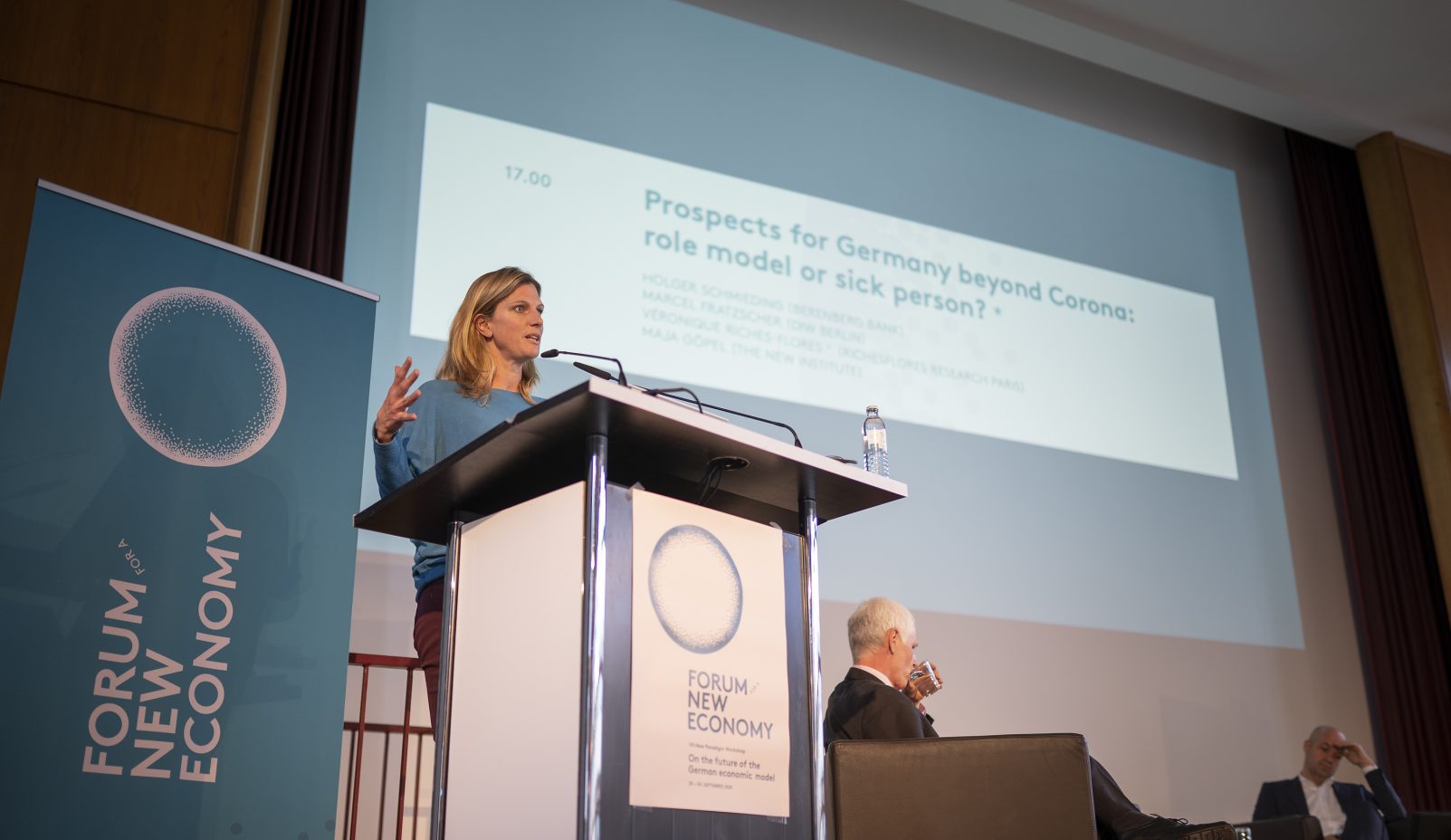THE STATE
Highlights: Prospects for Germany beyond Corona: role model or sick person?
An excerpt of the discussion among Maja Göpel, Véronique Riches-Flores, Holger Schmieding and Marcel Fratzscher on the efficacy of Germany´s answer to the Corona crisis and what awaits the country after the pandemic.
BY
THORE BECKMANNPUBLISHED
5. OCTOBER 2020READING TIME
5 MIN
The first day of the VII New Paradigm workshop saw a lively discussion about what might be the post-Corona prospects for Germany.
In view to the government answers to this exceptional crisis, Véronique Riches-Flores from Richesflores Research Paris provided some useful insights on the short-term economic prospects for Germany. In comparison to the weak French stimulus package, she says, Germany´s answer to the Covid-19 crisis appears to be calibrated; especially in relation to the most pressing issues such as boosting internal demand, supporting businesses and the expenditure on infrastructure. Whether or not it will be enough to save the German industry depends on many factors. Among all, Germany´s ability to adjust to new structural changes. Véronique Riches-Flores claims that globalisation is moving back, while protectionism is growing. And as structural demand for industrial goods weakens, the German export-led model of industrial goods to emerging countries becomes outdated.
Climate issues and an ageing population – a pattern that will most likely intensify in the future – put an extra weight on industry and global trade. Germany´s production remains focused on heavy products, worker-intensive and carbon-intensive industry. Its productivity gains risk being hit hardly if the country does not adequately react to those changes by shifting towards a low-carbon, technology-intensive industry. To do that, Germany should seek for a deeper European integration and Europe itself must accelerate its economic transformation and promote a new generation of investments.
Maja Göpel from The New Institute switched then the emphases onto the environmental issue by pointing out to the need for immediately changing the way we currently intervene in the soil or ecosystems. Climate change she says, made it clear how much Germany, as much as other industrialised countries, are actually dependent on resources being mined in other countries – with all the environmental and social distortions that this entails. To this regard, Germany not only is a world champion exporter, but also a very strong importer.
If we look at ecological resources, it appears that two-third of the land Germany needs for its consumption comes from outside.
Raw material extraction is yet another story, with 90 percent of it occurring in non-German lands. It is therefore important to go back to the debate over the ecological footprint and make a life-cycle-assessment; that is to asses where the raw materials used within a certain country have been extracted from. This would allow for a global perspective over resource use and eventually facilitate the way for a systematically conceived circular economy. A point where Germany seems to be lagging behind. Furthermore, political strategies do not seem to be in line with the budgetary needs of the necessary interventions for instating a transformation. That means there is a huge need for taxes. Be it a CO2 tax, a digital tax or a tax on unearned income from purely speculative gains, the point is finding the efficiency-boosting forms of taxation.
Eventually Marcel Fratzscher from DIW adds a social component to the points raised above, namely the increased social polarisation.
Among the greatest challenges that we will have to face in the coming years are what he calls the three Ps: populism, protectionism and paralysis
Social polarization, in this sense, represents a valid explanation to the unveiling of the three Ps and might further accelerate during this pandemic. Indeed, people with low incomes, poorer security and lower qualifications are those who are most affected by this crisis. Regional disparities in Germany have also increased significantly over the last ten years; not only between East and West, but also along the South-North divide. So are gender disparities. System relevant professions that are on average less well paid in Germany and get less recognition are mainly done by women. Fratzscher warns that social polarisation is increasing in many areas of our society, and not only within Europe. Therefore, if we are to avoid cementing the old structures we should not only focus on short-term stabilization.
